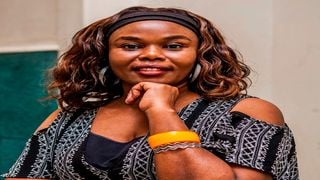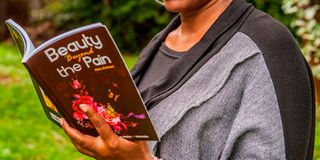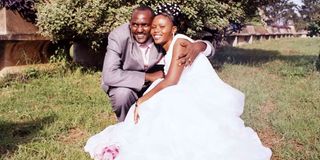
When Mary Muthiani lost her husband, it was not only how he was killed that tormented her, it was also how to help her children come to terms with the loss of their father.
| BILLY OGADA| Nation Media GroupDN2
Premium
‘Grieving for my husband while raising children was most painful juggling act’ widow says
What you need to know:
- When Mary Muthiani lost her husband, it was not only how he was killed that tormented her. Her husband was killed infront of his child.
- Her daughter’s trauma presented itself through nightmares, the shooting on December 3, 2011, of her father by thugs who were also hurling death threats to her mother.
When Mary Muthiani lost her husband, it was not only how he was killed that tormented her. Her husband was shot as they were driving through Nairobi.
Her three-year-old daughter watched her father slump over the steering wheel as gunshots rang out and blood seeped through his clothes. And Mary watched her husband gasp his last breath while she was heavily pregnant.
“Everything was a blur. I cannot recall how the car came to a standstill on the side of the road. I remember the gunshots and the police. But his burial, me giving birth to our son… everything was a blur,” she says.
No one heals completely from the loss of a spouse. However, some widows and widowers hold onto the grief for too long that it paralyses them. They stop living. The wardrobe still has his shirts as they were the morning he left for work or the shoes neatly arranged like she could walk back in the door at any moment and pick them off the rack.
The pain is even worse if you are grieving while parenting.
“For me, I may have been alert to my needs and my children’s; I fed the newborn, bathed the older one, went to the salon, but I was operating more like a zombie than a mother, or a human being,” Mary says.
One day, she says, she realised that she had to be intentional about healing so that she could be a better parent and start living again. Her healing came from journaling and finally compiling the notes into a book.

Beauty Beyond the Pain, a book written by Mary Muthiani.
“At first, I journaled my daily experiences. Most of them were questions to God,” she says.
One of the questions that she kept asking God was whether she and her late husband, James Mutua had not been in His plans. James was a pastor.
“What surprised me was that the journaling helped me embrace my pain. I’d write and cry or cry and write. The writing forced me to emotionally go back to the tragedy, the events thereafter, my feelings and sorrow,” she says.
As healing started, she managed to notice her daughter’s pain too.
“That’s when I realised that my daughter, who was three when she lost her father, was also going through grief and trauma. I had thought that I, as a wife and their mother, was the only one who felt the loss of my husband.
My daughter and our unborn son were as affected as I was but in a different manner. They lost their dad. I, as an adult, who still has her parents, cannot fully grasp what it means to lose a parent,” she says.
Her daughter’s trauma presented itself through nightmares, the shooting on December 3, 2011, of her father by thugs who were also hurling death threats to her mother, looming over her mind.
“I still weep for my children, but I know that they too have their own healing journey. I tell them about their dad, especially my son who did not see him, but also my daughter, who was too young to remember some details about her father. I never knew that one can mourn someone that they have never met, but my son has made me realise that this is possible,” she says.
Healing can be slothful.
“It is a process, and it cannot be rushed or skipped. At first, I wanted a quick solution to my pain. In fact, I wanted out of it. If I had found a way to hasten it, wake up, and feel no more pain, I would have grabbed that chance.
But there is no such solution and emotional pain is impossible to ignore. You can postpone it for a bit, but it still stays there with you, waiting to be felt,” she says.
Her second step to healing came from removing her husband’s shirts from his side of the closet. Many widows and widowers ask themselves, “Do I let his clothes hang neatly in the wardrobe for two more years? Or leave their photos displayed on the walls?”

Mary Muthiani (right) and her late husband James Mutua during their wedding in 2006. Mary lost her husband after four years of marriage.
“It’s a painful process, worse than a razor blade slashing through your skin. I had avoided this pain but I finally did it and my healing process began,” she says.
Grieve with children
But as a widow or a widower, you must also help your children deal with their grief as you deal with yours.
“At one of my grief therapy appointments, the counsellor advised me to answer every question as honestly and simply as the children asked.
For example, when my son turned 11, he asked about his father’s burial place. I took them there and we all had a deep moment of fresh grief and reflection. It was emotional and hard, but important for the children to know where their father was buried. I have learned to talk to the children about their dad,” she says.
The counsellor, she adds, helped her understand that grieving is no respecter of time or age.
“Time does not heal, contrary to what people say. Time might cover up, or numb the grief, but it does not take away the pain.
My daughter seemed all right for 11 years since she lost her dad, but then grief came knocking when she joined high school.
I had gone through my healing journey, but she had not.
I had to support her through the process, even if it meant me reliving painful memories.
I had to provide honest responses to her questions. For example, my daughter looks a lot like her dad, and I have let her know this.
She gets to feel a sense of pride and belonging when I tell her that she resembles her dad, including how she walks and chews exactly like him!
My son looks like me, but he is his father’s son in a lot of other mannerisms such as his outgoing personality,” she says.
“James was confident, outgoing, and unlike me, he was comfortable at the pulpit or on any stage,” she adds.
Expert’s view
Gladys Kibui, a counsellor and training facilitator for trauma healing in Nairobi says children are often ignored and given the wrong information during the grieving period.
“Depending on their age, children will be able to express their pain through crying, drawing, playing, singing, and journaling.
Just like adults, failure to express the pain of loss may lead to health problems,” she says.
How do you grieve with children? Do you need to see a therapist?
Gladys says most people can cope with their pain through normal community support. However, there are cases where grieving is more difficult, and therapy or counselling can help prevent health complications.
“Families facing multiple deaths, sudden or unexpected deaths, violent deaths, absence of a corpse, unconfirmed deaths, death of a breadwinner, suicidal deaths, murder, or the death of a child need the assistance of a counsellor,” she says.
Most grieving spouses mask pain to move on or look like they have moved on, and this has its downsides.
While grieving, Mary says, she felt a sense of shame. Something she cannot explain.
“People make a grieving person feel self-pity, exposed, and ashamed of their loss,” she says.
Gladys, the counsellor, adds that many people perceive grieving as a sign of weakness. The grieving person is shamed for crying or being angry.
“Some cultures have rituals around grieving such as crying publicly. A grieving person who does not subscribe to the norms is suspected of not caring about the dead person.
This may lead to mechanical grieving just to please the family,” she says, “this may cause health complications, mental and physical. Not many cultures understand what widows and widowers experience.”
How long should the grief period last?
“Grieving has no timeline. Some people may take a year, others longer. However, when a person takes more than two years in one stage of grieving, they may need support to move towards their new normal,” Gladys adds.
Twelve years after the loss of her husband, Mary has come out of her shell.
Is there good that can come out of grief? I ask.
“I would not call it good, but a necessary learning. For example, I became an author, a public speaker, a preacher and a grief counsellor.
I would never have realised this potential in me if I had not faced my pain. Even speaking to 10 people before the loss of my husband was something that I could never have dared.
Today, I speak to hundreds, confidently and feel a sense of joy and fulfilment when someone says I’ve inspired them. The potential is hidden within you. Unfortunately for me, grief brought out mine,” Mary says.
On navigating the widowhood maze, being a single parent and a solo provider have been hurdles.
“Initially, I could not figure out how life would be without James. I was so fearful. Fear is cold,” Mary says, repeating a line from her memoir, “Beauty Beyond the Pain.”
“Now I have the joy of watching my children grow. They are turning out well.”
Love after loss
Widowhood yanked her out of her comfort zone.
“As a wife, my identity was shaped by my husband. He was a good man, and it was easy to lean back and depend on him,” says Mary.
When you are a wife, a husband acts as your buffer, Mary adds. She studied clinical biochemistry, but left full-time employment because she was confident that her husband would provide for the family as she raised their young children.
“He would think through the difficult stuff such as finances or lack thereof. As James’ wife, I easily asked him for money for making my hair. Now I must provide for myself and my children, without compromising my values and morals as a Christian woman.
On dating, I let anyone who shows interest in me know that I come as a package; me and my children. I must ensure that anyone I introduce into their lives does not add to their grief. Also a Christian, I am cautious to let men know that my terms of engagement include celibacy until marriage,” she says.
Her advice to widows is something she emphasises in her book.
“You will live again. Many great destinies are born out of pain. Have the courage to face your pain, honestly, and find healing,” Mary says.
Top ways to cope with loss and help your children grieve
When my husband was shot dead, we had a three-year-old daughter, and I was pregnant with the second-born. Here's how I have coped and helped my children deal with the loss:
- Write down your daily emotions, journalling will help you deal with pain.
- See a grief counsellor. Families facing multiple, sudden or violent deaths, absence of a corpse, death of a breadwinner, suicidal deaths, murder, or the death of a child need to seek professional counselling.
- Grieving has no timeline. However, when it takes more than two years, see a counsellor. Be intentional about wanting to move on.
- When a child asks about their dead parent, answer every question as honestly and simply as the child asked. For example, when they ask to see their father's burial site, take them.
- Removing a spouse's clothes from the closet or shoes off the rack is a big step to healing.
- Grieving children may have nightmares. Be there to help them calm down.
- When dating, don’t introduce partners to your children who might reignite the pain of them losing their father or mother
- It’s normal to see outbursts in children a decade after the loss of a parent. A therapist will help them through these emotional reactions.



